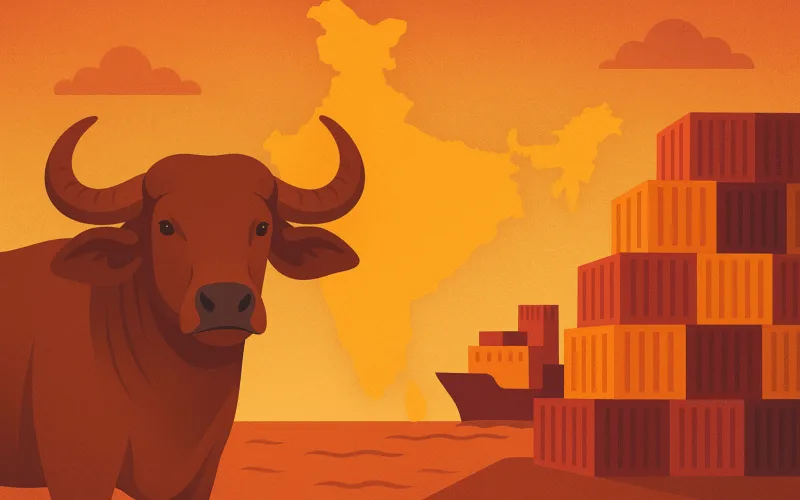India, known globally for its large vegetarian population, is set to retain its crown as the world’s largest buffalo meat exporter in 2025.
According to a recent report from the U.S. Department of Agriculture (USDA), India’s projected buffalo meat exports are expected to reach 1.64 million metric tons this year.
In 2023–24 alone, the country exported 1.3 million metric tons, generating nearly $3.74 billion USD in export earnings.
Major importers include Vietnam, Malaysia, Egypt, Iraq, and Saudi Arabia—regions where Indian buffalo meat (also known as carabeef) is in high demand.
| Fiscal Year | Export Volume (MMT) | Export Value (USD Billion) | Notes & Sources |
|---|---|---|---|
| 2020–21 | ~1.08 MMT | ~$2.90 billion | APEDA Annual Report 2020–21 |
| 2021–22 | ~1.12 MMT | ~$3.17 billion | APEDA Performance Reports |
| 2022–23 | ~1.20 MMT | ~$3.30 billion | APEDA Data Summary |
| 2023–24 | ~1.30 MMT | ~$3.74 billion | APEDA Buffalo Meat Data |
| 2024–25 (Est.) | ~1.50 MMT (projected) | ~$4.20 billion (est.) | Based on USDA trends and year-on-year growth |
| 2025 (Projected) | 1.64 MMT | ~$4.5+ billion (est.) | USDA Semi-Annual Report (2024) |
A Global Meat Powerhouse with a Vegetarian Identity
Paradoxically, while India’s meat exports soar, the country continues to cultivate a global image of vegetarianism. Surveys estimate that between 20% and 42% of Indians identify as vegetarians, with figures commonly cited around 38%—the highest in the world.
This dual image—exporting millions of tons of buffalo meat while marketing vegetarianism—has sparked criticism both domestically and internationally for its cultural and ethical inconsistency.
Beef Politics and the Human Toll
Beyond the statistics lies a troubling reality. Even as the nation profits from meat exports, cow protection politics and vigilante violence are inflicting real harm on citizens—particularly Muslims and marginalized groups.
In 2024, at least six of twelve mob lynching incidents were directly tied to accusations of cow slaughter or meat transport. These attacks led to 10 deaths, of which eight victims were Muslim.
An analysis by ACLED (Armed Conflict Location & Event Data Project) shows that from June 2019 to March 2024, over 20% of Hindu nationalist attacks on Muslims were motivated by cow protection ideologies.
Human rights organizations, including Human Rights Watch, have repeatedly warned of rising religious intolerance, unchecked vigilante violence, and political complicity in such acts.
The 2025 India chapter of their World Report documents a growing pattern of impunity for hate crimes and mob lynchings related to beef consumption and transport.
Despite official denials, civil society groups argue that the beef-related violence is not just cultural but politically mobilized, targeting religious minorities under the guise of animal protection.
India’s buffalo meat trade is a crucial pillar of its agricultural economy, employing thousands across the supply chain—from slaughterhouses to cold storage, transport, and logistics. Yet the benefits of this booming industry are sharply contrasted by the disproportionate risks faced by Muslims, who form a significant portion of workers in the sector.
While the country continues to export meat abroad, it punishes those associated with it at home—often based on rumor or communal prejudice.
India’s success as the world’s top buffalo meat exporter in 2025 is economically significant—but ethically complex. As meat exports climb and foreign demand grows, so does the domestic cost in human lives, religious freedom, and civil peace.
The contradiction between a “vegetarian nation” narrative and a billion-dollar meat industry is more than ironic—it’s a dangerous double standard with real human consequences.




 WhatsApp Channel
WhatsApp Channel
 Instagram
Instagram
 Facebook
Facebook
 X (Twitter)
X (Twitter)